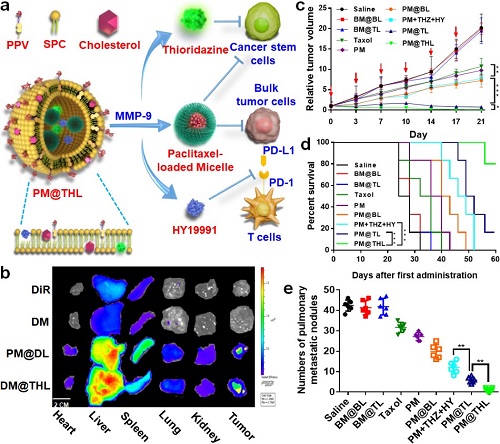“鸡尾酒”递药策略有效改善乳腺癌治疗
来源:《先进材料》
作者:郎天群等
时间:2019-01-07

我国乳腺癌发病率在女性癌症患者中位居首位,其转移与复发也是导致乳腺癌患者死亡的主要原因。化疗与免疫治疗相结合已成为近年来癌症治疗的研究热点,但肿瘤干细胞(CSC)往往对T细胞耐受,且CSC在肿瘤组织中比例较低,化疗药物对CSC的靶向性差。
针对上述难题,中国科学院上海药物研究所药物制剂中心博士研究生郎天群等在副研究员尹琦和研究员李亚平的指导下,设计了一种鸡尾酒递药策略:通过构建时空可控纳米粒(PM@THL),将针对普通肿瘤细胞和肿瘤干细胞的化疗与免疫检查点阻断疗法整合起来,PM@THL具有胶束-脂质体双层结构及酶敏感/酸敏感双重响应性,可有效将化疗药物紫杉醇、抗CSC药物硫利达嗪及PD-1/PD-L1小分子抑制剂HY19991包载其中,用于转移性乳腺癌的治疗。实验结果显示:PM@THL粒径在100 nm左右,且不易被单核巨噬系统清除,药动学稳定性良好,递送至肿瘤组织部位时则解离为粒径约40-50 nm的胶束,有利于被肿瘤细胞摄取,同时达到时空贯序释药目的。在转移性乳腺癌小鼠模型中,PM@THL可有效增加肿瘤细胞内药物浓度,肿瘤抑制率达93.45%,肺转移抑制率达97.64%。同时,受试组小鼠的肿瘤组织中CSC比例降低,杀伤性T细胞浸润数目升高,动物生存期大幅延长,给药周期结束后再次接种肿瘤,其瘤体积仍呈现持续下降趋势。该工作为防治乳腺癌转移与复发,进一步改善乳腺癌治疗效果提供了一种新思路。
上述研究成果于12月6日发表在国际期刊《先进材料》(Advanced Materials)上,该项目获得国家自然科学基金重点项目、创新群体基金项目,以及中科院青年创新促进会的支持。(来源:中国科学院上海药物研究所)
Cocktail Strategy Based on Spatio-temporally Controlled Nano Device Improves Therapy of Breast Cancer
Abstract Metastatic breast cancer may be resistant to chemo‐immunotherapy due to the existence of cancer stem cells (CSC). And the control of particle size and drug release of a drug carrier for multidrug combination is a key issue influencing therapy effect. Here, a cocktail strategy is reported, in which chemotherapy against both bulk tumor cells and CSC and immune checkpoint blockade therapy are intergraded into one drug delivery system. The chemotherapeutic agent paclitaxel (PTX), the anti‐CSC agent thioridazine (THZ), and the PD‐1/PD‐L1 inhibitor HY19991 (HY) are all incorporated into an enzyme/pH dual‐sensitive nanoparticle with a micelle‐liposome double‐layer structure. The particle size shrinks when the nanoparticle transfers from circulation to tumor tissues, favoring both pharmacokinetics and cellular uptake, meanwhile achieving sequential drug release where needed. This nano device, named PM@THL, increases the intratumoral drug concentrations in mice and exhibits significant anticancer efficacy, with tumor inhibiting rate of 93.45% and lung metastasis suppression rate of 97.64%. It also declines the proportion of CSC and enhances the T cells infiltration in tumor tissues, thus prolongs the survival of mice. The cocktail therapy based on the spatio‐temporally controlled nano device will be a promising strategy for treating breast cancer.
原文链接:https://onlinelibrary.wiley.com/doi/epdf/10.1002/adma.201806202




